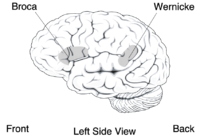
Photo from wikipedia
Abstract Purpose: There has been debate about labels in relation to speech and language impairments. However, children’s views are missing from this debate, which is risky considering that labels with… Click to show full abstract
Abstract Purpose: There has been debate about labels in relation to speech and language impairments. However, children’s views are missing from this debate, which is risky considering that labels with negative associations may result in stigma. The aim of this study was to explore the range of identities which children with primary speech and language impairments presented in their narratives and to investigate their evaluations of these identities with a view to understanding the values they attach to labels. Method: Eleven children aged 9–12 years with primary speech and language impairments were recruited to the study. Fifty nine semi-structured interviews were conducted with the aim of generating storied accounts of everyday experiences. The data were analysed using thematic analysis. Two themes were identified in the data: desired identities and undesired identities. Result: The findings suggest that the children were actively involved in identity construction and wanted to be seen in positive ways. They disliked labels assigned by others, which they considered portrayed them in negative ways. Conclusion: The debate about labels could be progressed by consulting with children themselves asking for their ideas in relation to labels in specialist education, and speech and language pathology.
Journal Title: International Journal of Speech-Language Pathology
Year Published: 2017
Link to full text (if available)
Share on Social Media: Sign Up to like & get
recommendations!